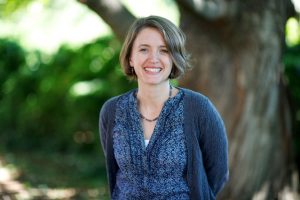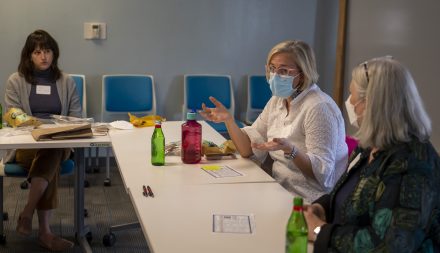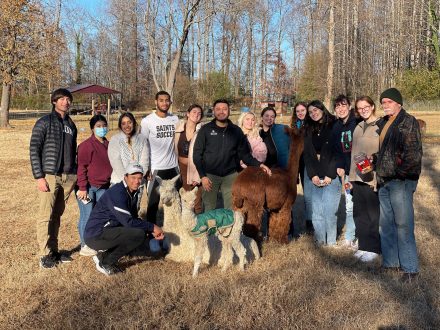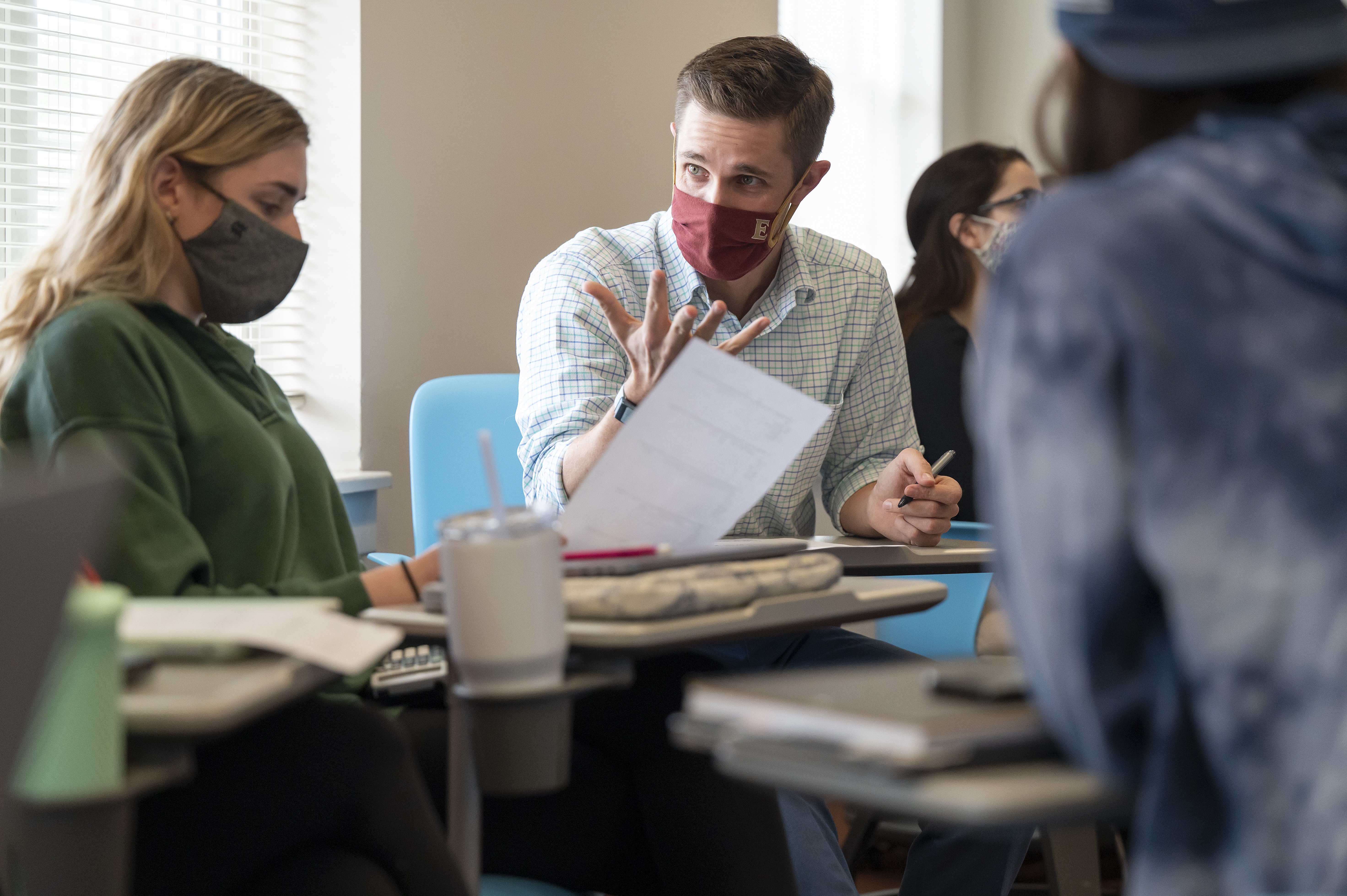Elon’s Center for the Advancement of Teaching and Learning is helping position the university as a national thought leader in teaching practices and supporting student learning.
Just days into his first semester at Elon, Brandon Sheridan was already getting to know the Center for the Advancement of Teaching and Learning. Like all new faculty, Sheridan participated in an overarching series of information programs and workshops that is organized and delivered by the center, commonly referred to as CATL. It’s an opportunity to quickly establish connections with CATL and its staff, who offer a wide range of support to faculty, whether it’s their first day on campus or their 10th year teaching at Elon.
“As a faculty member at a teaching-focused institution, it means everything to have a resource like CATL,” says Sheridan, an assistant professor of economics and a CATL Faculty Scholar. “You can’t be about teaching and experiential learning if you don’t support it. CATL gives faculty members the resources to do what they do best.”
Launched in 2005 with Assistant Provost for Teaching and Learning Peter Felten as its founding director, CATL has become a vital resource for Elon’s faculty and a catalyst for effective teaching and engaged learning at Elon. The center has fostered a collaborative and supportive culture among faculty while advancing the scholarship of teaching and learning, with research that is helping shape and advance the practice and impact of teaching at myriad colleges and universities.

“CATL has been a leader in thinking about the idea of the scholarship of teaching and learning, and baking that into the mission,” says Deandra Little, assistant provost and director of CATL since 2013. “The conversations about teaching and learning that are happening here are on a different level from what I hear at other institutions.”
Joining Little on the CATL staff are associate directors Mary Jo Festle, Kelsey Bitting and Olivia Choplin, all of whom are teaching faculty at Elon, keeping their feet firmly planted within the classroom as well as within the work of CATL. Supporting the center is Program Coordinator Christina Wittstein. Together, the team provides support for Elon faculty that ranges from single-session community workshops to extended support for scholars that stretches over multiple years. CATL’s programs and services include guided opportunities to develop teaching projects with colleagues, grant funding for initiatives such as inclusive teaching practices or the scholarship of teaching and learning, and one-on-one consultations with faculty, including in-class assessments.
In June, CATL will partner with Elon’s Teaching and Learning Technologies to offer the 18th annual Teaching & Learning Conference, with the theme “Educating Engaged Citizens for an Uncertain and Changing World.” The conference has historically drawn 300-plus participants from dozens of higher education institutions throughout North Carolina and the country, positioning Elon as a thought-leader in teaching practices and supporting student learning.
Little believes that the ethos of the faculty at Elon is to take a scholarly approach to teaching — not just to the work and research within their disciplines — and CATL is there to help guide and support that approach, both individually and collectively. “Support for innovations in teaching and learning is something that has been at the heart of what CATL is doing since it was founded,” she adds.
Choplin distinctly remembers talking with a peer at another institution shortly after she joined the Department of World Languages and Cultures as an assistant professor of French and saying, “I can’t imagine having landed at a better place for people who really care about teaching.” She describes herself as a fan of CATL from the beginning, and turned to the center for support with a research opportunity. She took her work with CATL another step forward in 2021 when she joined the team as associate director. “I thought this would be a great way for me to meet incoming faculty, to continue to grow as a teacher and scholar, to dive deeply into the scholarship of teaching and learning, and to facilitate other people on those journeys,” Choplin says.

The scholarship of teaching and learning is not “second fiddle” at Elon, she says, and the university values the investments faculty are making in that area within its promotions and tenure process. That empowers CATL to offer the support necessary to try innovative approaches, such as a Winter Term course Choplin taught three years after coming to Elon that included producing a full-length play in French during the intensive three-week term. She was able to tap into CATL resources to make that possible.
“The learning gains I saw in that immersive experience were incredible,” Choplin says.
Among the services CATL offers is a mid-semester focus group with students who share anonymous feedback for their professor about how their learning is being supported and how it can be enhanced. Offering that review and analysis in the middle of the semester instead of at the end allows students to provide feedback at a point when the professors can pivot or adapt their approach to the course. “It also becomes a conversation point for faculty to remind students that this is why we are doing these things, and this is how it connects to your educational and eventually professional experience,” Little says.
As a CATL Faculty Scholar, Sheridan has been engaged for the past two years in examining the level of active, engaged learning that faculty members perceive is happening in their classrooms and how that compares to reality. “As an economist, I want to know what I’m doing is effective,” Sheridan says. His selection as a CATL Faculty Scholar gave him the time and financial support to extend and expand his research that draws from recorded classroom sessions to examine the amount of lecturing versus active learning and explore the question of what an effective balance is. “CATL has experts who think about these topics every day,” he says. “They are so available and so knowledgeable.”

Asked about her favorite part of leading CATL, Little is quick to reply that her role offers her the opportunity to engage with faculty across campus to learn what they are passionate about, and how that plays out in the classroom. It’s not just faculty early in their careers, but those further along with tenure and scores of publications who are still exploring how to become better teachers.
“I really love talking to people from a variety of disciplines to try to understand what teaching looks like in their context, why it matters to them, and how we can tweak or change things to help the reality match their vision of what they want to be,” Little says. “It’s so enriching to hear about the really creative ideas they are coming up with to help their students better understand and learn about things that matter to them.”



